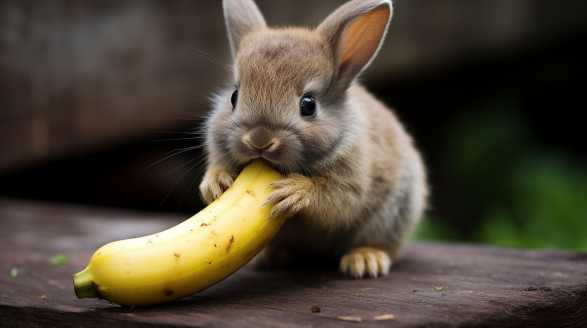Introduction
Hey there, fellow bunny lovers! Are you ready for a journey into the world of rabbits and bananas? Can Rabbits eat bananas? Let’s find out.
I’m thrilled to share with you all the juicy details about rabbits and their love affair with bananas.
When it comes to our furry little friends, we all want to give them the best of the best. And what could be better than treating them to a delicious, sweet, and oh-so-tasty banana?
We’ll explore the benefits and risks of feeding bananas to our bunnies, discover the dos and don’ts of introducing bananas into their diet, and even uncover some mouthwatering banana treat recipes that will have your furry friend binkying with joy!
So, whether you’re a seasoned rabbit owner looking to spice up your bunny’s mealtime or a bunny lover considering adopting one of these fluffy wonders, this article is for you. Get ready to learn everything you need to know about rabbits and bananas in a fun, conversational style that will make your heart hop with excitement!
Are you ready to embark on this adventure? Then let’s dive right in and explore the world of rabbits and bananas like never before!
**Do Not Give Any Food To Your Rabbit Without Consulting A Veterinarian
Key Takeaways
- Rabbits can safely eat bananas as an occasional treat, but moderation is key due to the high sugar content.
- Bananas provide essential nutrients such as vitamin C, potassium, and fiber for rabbits.
- Excessive banana consumption can lead to digestive upset, weight gain, tooth decay, and nutritional imbalances.
- When introducing bananas to a rabbit’s diet, start with small portions and monitor their reaction and stool consistency.
- Remove the banana peel before offering it to your rabbit.
- Bananas should not replace the staple diet of hay, fresh vegetables, and pellets for rabbits.
- Consult a veterinarian if you have any concerns or questions about your rabbit’s diet.
- Variety in a rabbit’s diet is important, and other rabbit-friendly fruits can be introduced in moderation.
- Always prioritize hay and vegetables in a rabbit’s diet, and bananas should only be treated as occasional supplements.
Are Bananas Safe for Rabbits to Eat? Everything You Need to Know
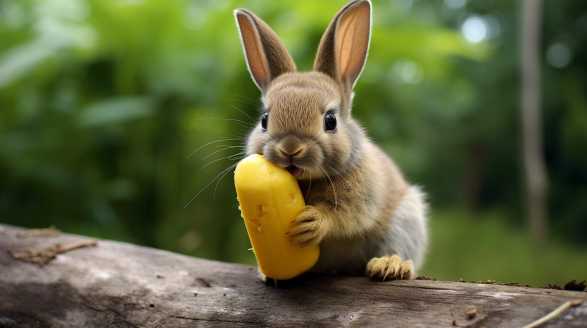
As a bunny lover and owner, one thing that constantly pops into my mind is what food is safe for my furry friend to consume. And bananas have been a topic of great discussion among rabbit owners.
Let’s dig in and find out!
Can Bunnies Munch on Bananas?
Many rabbit owners wonder if their fluffy companions can enjoy the sweet taste of bananas. The answer is yes, rabbits can eat bananas.
Why Feed Bananas to Bunnies?
1. Nutritional Value
Bananas are not only a tasty treat but also provide essential nutrients for rabbits. They are a great source of important vitamins such as vitamin C and vitamin B6.
These nutrients aid in maintaining your rabbit’s overall health and well-being.
2. Variety in Their Diet
Just like humans, rabbits appreciate some culinary diversity. Adding bananas to their usual diet can provide much-needed variety, making mealtime more enjoyable for your furry friend.
Moderation is Key
While it’s safe for rabbits to nibble on bananas, it’s crucial to remember the importance of moderation. Offering small amounts as an occasional treat is the best practice.
Possible Side Effects
Although bananas are generally safe for rabbits, excessive amounts can lead to some unwanted side effects for our furry pals. Here are a few things to keep in mind:
1. Digestive Upset
Bananas contain natural sugars, which can cause digestive issues if consumed in excess by rabbits. This can lead to an upset tummy, loose stools, and potentially even more severe conditions such as gastrointestinal stasis.
2. Weight Gain
Bananas are relatively high in calories. While this may be beneficial for humans during a workout, rabbits don’t need as many calories, and excessive banana consumption can lead to unwanted weight gain.
3. Tooth Decay
Like humans, rabbits are prone to dental problems, and it’s essential to consider the impact of sugary treats on their oral health. Bananas contain natural sugars, which, if not washed away by saliva or water, can contribute to tooth decay.
The Right Way to Serve Bananas to Your Bunny
Now that you know the dos and don’ts of feeding bananas to your rabbit, here’s the right way to serve this enticing treat:
1. Organic is Best
Choose organic bananas whenever possible. This helps ensure your rabbit isn’t consuming any harmful pesticides or chemicals commonly used in conventional farming practices.
2. Ripe but not Overripe
Ripe bananas are the safest option for rabbits, as they are softer and easier to chew. However, be careful not to offer overripe bananas, as they contain a higher sugar content, which can upset your bunny’s digestion.
3. Small Portions
Delicious as they are, bananas should only be given as an occasional treat, and in small portions. One or two small slices of banana at a time are sufficient for your rabbit to enjoy this delightful treat without any negative effects.
4. Remove the Peel
Before serving a slice of banana to your bunny, make sure to remove the peel completely. The peel can be difficult for them to digest and may even pose a choking hazard.
Bananas can safely be added to a rabbit’s diet in moderation. With their nutritional value and the enjoyment they bring, bananas can make a delightful treat for your furry friend.
Always consult your veterinarian if you have any concerns or questions regarding your rabbit’s diet. So go ahead, give your bunny a slice of banana, and watch their adorable munching skills in action!
Bananas and Rabbit Dental Health: How They Interact
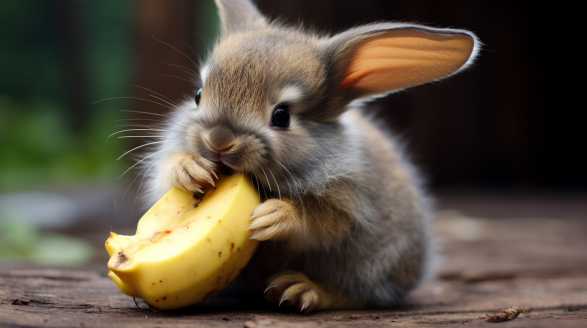
When it comes to keeping your furry friend’s teeth in tip-top shape, it’s important to consider their diet. As a rabbit owner, you may be wondering if bananas have any impact on your bunny’s dental health.
I’ll uncover the truth behind the interaction between bananas and rabbit dental health.
Are Bananas Bunny-Friendly?
The short answer is yes! Rabbits can enjoy the occasional banana as a treat.
However, it’s crucial to note that moderation is key. Too much of a good thing can have its drawbacks.
Nutritional Benefits of Bananas for Rabbits
- Vitamin C: Bananas are packed with vitamin C, which is essential for your rabbit’s immune system and overall wellness.
- Fiber: Fiber plays a vital role in maintaining a healthy digestive system for rabbits. Bananas, although not as high in fiber as hay or leafy greens, still offer a decent amount.
- Potassium: Bananas are rich in potassium, an electrolyte that helps regulate fluid balance in your bunny’s body.
- Natural Sugars: While too much sugar can be harmful to rabbits, the natural sugars found in bananas are easily digested and can provide a quick burst of energy.
A Word of Caution: Sugar Content
Although bananas offer several nutritional benefits, it’s crucial to keep an eye on their sugar content. Too much sugar can lead to gastrointestinal issues and potentially tooth decay in rabbits.
As a general rule, limit your bunny’s banana intake to a small slice once or twice a week.
Chewing Action: The Toothbrush Effect
Now that we’ve established that bananas can be a part of your rabbit’s diet, let’s explore how they interact with your bunny’s dental health. When your bunny munches on bananas, their teeth go to work, chewing away at the fruit’s soft and slightly sticky texture.
A Well-Balanced Diet for Optimal Dental Health
While bananas can contribute positively to your rabbit’s dental health, they should not replace a well-balanced diet. Hay should make up the majority of your bunny’s diet, as it provides the necessary fiber for maintaining proper tooth wear and gut function.
Dental Health Red Flags
It’s essential to keep a close eye on your rabbit’s dental health to catch any potential issues early on. Here are some signs to look out for:
- Overgrown Teeth: Rabbits’ teeth continually grow, and if they are not worn down properly, they can become overgrown and lead to serious dental problems.
- Drooling: Excessive drooling can be a sign of dental pain or difficulty in eating.
- Weight Loss: Dental issues can make it challenging for rabbits to eat properly, leading to weight loss.
- Red or Swollen Gums: Inflammation or infection in the mouth can cause red or swollen gums.
If you notice any of these red flags, it’s important to consult your veterinarian promptly. Regular dental check-ups are also recommended for maintaining your bunny’s oral health.
In Summary
Bananas can be a tasty and beneficial addition to your rabbit’s diet, contributing to their overall dental health. However, it’s essential to remember that moderation is key.
By maintaining a proper diet and staying vigilant about dental health, you can ensure your bunny’s pearly whites stay in excellent condition.
Can Rabbits Eat Banana Peels? The Surprising Answer
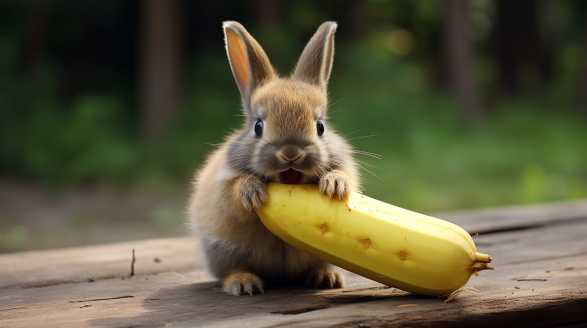
When it comes to our furry little friends, we want to ensure they have a balanced and healthy diet. As a rabbit owner, it’s only natural to wonder if it’s safe to offer them banana peels, alongside their regular diet.
So, let’s dive into the truth behind this captivating question.
The Curiosity Begins
One day, while peeling a banana for my morning smoothie, I couldn’t help but wonder if my adorable bunny, Flopsy, would enjoy the peel as a nutritious treat. Mustering my excitement, I embarked on a virtual quest to find out if rabbits could safely nibble on banana peels.
The Good News!
Much to my delight, the answer is a resounding yes—rabbits can indeed eat banana peels. However, as with any addition to their diet, there are a few important considerations to keep in mind.
Nutritional Benefits of Banana Peels
Banana peels are packed with beneficial nutrients that can enhance your rabbit’s overall health. Here’s a list of the key nutrients found in banana peels:
- Fiber: Banana peels are an excellent source of dietary fiber. This aids in maintaining healthy digestion and can prevent various digestive issues in rabbits.
- Potassium: Just like the fruit itself, banana peels contain potassium, which plays a vital role in maintaining heart and muscle health.
- Vitamin C: Vitamin C is essential for rabbits, as they are unable to produce it naturally. Banana peels can provide a small but valuable dose of this vital nutrient.
- B Vitamins: These vitamins are involved in various metabolic processes and can contribute to your rabbit’s overall well-being.
- Niacin: Niacin, also known as vitamin B3, supports a healthy cardiovascular system.
These nutritional benefits make banana peels an attractive addition to your rabbit’s diet. But remember, moderation is the key!
Moderation is Crucial
While banana peels can be a healthy treat, it’s important not to go overboard. Excessive consumption may lead to gastrointestinal upset in rabbits.
Quantity control ensures that your bunny receives the nutritional benefits without experiencing any adverse effects.
Preparing Banana Peels for Your Rabbit
Now that we know rabbits can enjoy banana peels, here’s how to safely prepare them:
- Organic Bananas: Opt for organic bananas to avoid harmful pesticides that may linger on the peel.
- Thorough Washing: Rinse the banana peel thoroughly with water to remove any remaining pesticide residue.
- Remove Stickers: Ensure all stickers or labels are peeled off completely.
- Cut into Small Pieces: Slice the banana peel into small, manageable pieces that your bunny can nibble on easily. Remember, safety first!
Things to Keep in Mind
While banana peels can be a nutritious addition to your rabbit’s diet, there are a few important considerations to bear in mind:
1. Introduce Slowly
Just like with any new food, introduce banana peels gradually to your rabbit’s diet. Monitor their reaction and watch for any signs of digestive upset, such as diarrhea or bloating.
2. Variety is the Spice of Life
Remember that rabbits thrive on a diverse diet consisting of various fresh vegetables and hay. Although banana peels are safe and beneficial, they should be offered alongside a wide range of other rabbit-friendly foods.
3. Avoid Pesticides
Always choose organic bananas to minimize exposure to harmful pesticides. Pesticides can pose a severe risk to your rabbit’s health.
To answer the burning question, “Can rabbits eat banana peels?” – the surprising answer is yes. These peels offer valuable nutritional benefits, including fiber, potassium, and essential vitamins.
With the right precautions in place, treat your furry friend to an occasional banana peel snack, but always ensure a varied and balanced diet alongside it.
So, the next time you find yourself peeling a ripe banana, share the love with your rabbit. They might just thank you with a burst of excitement and an adorable flop-hop of joy!
Banana Treat Recipes for Rabbits: Homemade Delights
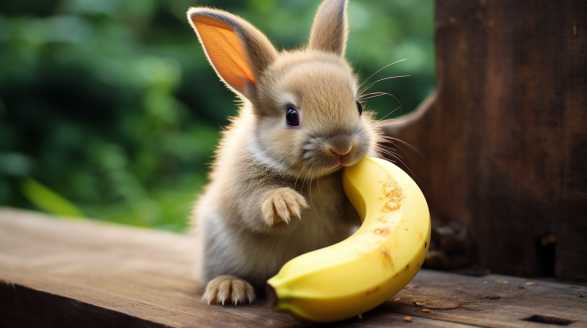
Rabbits are delightful little creatures that bring joy and companionship to our lives. As a proud rabbit owner, I am always looking for ways to spoil my furry friend with tasty homemade treats.
Not only are bananas a great source of essential nutrients and vitamins for rabbits, but they also make for a delicious and healthy snack. I will share with you some of the best homemade banana treat recipes for rabbits that are sure to make your fluffy companion hop with joy.
Why Bananas Are Great for Rabbits
Before we dive into the mouthwatering recipes, let’s first understand why bananas are an excellent choice for rabbit treats. Bananas are packed with potassium, vitamin B6, and dietary fiber, which contribute to the overall good health of your furry friend.
Too much sugar can upset a rabbit’s delicate digestive system, leading to potential health issues.
Benefits of Bananas:
- Rich in potassium
- Good source of vitamin B6
- High in dietary fiber
Basic Banana Surprise
This simple recipe is a great introduction to banana treats for rabbits. It combines the goodness of bananas with other rabbit-friendly ingredients to create a delightful surprise.
Ingredients:
- 1 ripe banana
- 2 tablespoons of rolled oats
- 1 tablespoon of hay pellets (optional)
Instructions:
- Peel the banana and mash it thoroughly in a bowl.
- Add the rolled oats and hay pellets (if using) to the mashed banana and mix well.
- Shape the mixture into small bite-sized nuggets.
- Place the nuggets on a baking sheet and freeze for at least 2 hours.
- Once frozen, remove the nuggets and serve them to your rabbit as a special treat.
Banana and Carrot Biscuits
Who doesn’t love a delicious biscuit? Well, rabbits certainly do!
Ingredients:
- 1 ripe banana
- 1 carrot, grated
- 1 cup of oat flour (you can easily make it by grinding rolled oats in a blender)
- 1 tablespoon of honey (optional)
Instructions:
- Preheat your oven to 350°F (175°C) and line a baking sheet with parchment paper.
- In a bowl, mash the banana until smooth.
- Add the grated carrot, oat flour, and honey (if using) to the mashed banana and mix well to form a dough.
- Roll out the dough on a floured surface to approximately ¼ inch thickness.
- Using cookie cutters, cut out shapes from the dough and place them on the prepared baking sheet.
- Bake for 15-20 minutes or until the biscuits are golden brown.
- Allow the biscuits to cool completely before serving them to your rabbit.
Frozen Banana Pops
On a hot summer day, there’s nothing more refreshing than a frozen treat. This recipe combines the goodness of bananas with a cooling twist.
Ingredients:
- 2 ripe bananas
- ¼ cup of plain yogurt
- 1 tablespoon of shredded coconut (optional)
Instructions:
- Peel the bananas and cut them into bite-sized chunks.
- Dip each banana chunk into the plain yogurt, making sure it is fully coated.
- Sprinkle the shredded coconut on top of the yogurt-coated banana chunks (if using).
- Place the coated banana chunks on a baking sheet and freeze for at least 3 hours.
- Once frozen, remove the banana pops from the baking sheet and serve them to your rabbit for a refreshing treat.
Banana and Parsley Hay Rolls
Rabbits love to nibble on hay, and these banana and parsley hay rolls combine the nutritional benefits of hay with the sweetness of bananas.
Ingredients:
- 1 ripe banana
- A handful of fresh parsley, finely chopped
- 1 cup of Timothy hay
Instructions:
- In a bowl, mash the banana until smooth.
- Add the finely chopped parsley to the mashed banana and mix well.
- Take small amounts of the banana and parsley mixture and roll them into small balls.
- Roll the banana and parsley balls in the Timothy hay, making sure they are fully coated.
- Place the coated balls on a plate and refrigerate for at least 1 hour.
- Once chilled, the hay rolls are ready to be served to your rabbit as a tasty and nutritious treat.
Spoiling your rabbit with homemade banana treats is a wonderful way to bond and provide them with a healthy snack they’ll love. The recipes shared in this article are just a few ideas to get you started, but don’t be afraid to get creative and experiment with different ingredients and flavors.
So, grab some bananas and start whipping up these delightful homemade treats for your beloved furry friend today!
Understanding the Sugar Content in Bananas: Is It Harmful to Rabbits?
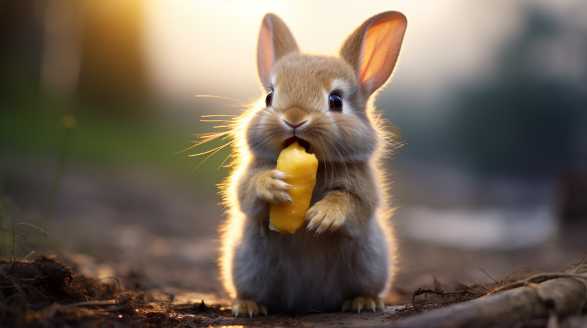
As a rabbit owner and enthusiast, I have often found myself perplexed by the question of whether bananas, with their naturally sweet taste, are safe for my furry friends. Rabbits have very sensitive digestive systems, and it is crucial to understand what is healthy and what could potentially harm them.
The Nutritional Value of Bananas
Before we discuss the sugar content of bananas, let’s take a moment to explore their overall nutritional value. Bananas are packed with essential vitamins and minerals, making them a favorite among humans.
This combination of nutrients contributes to the overall health and well-being of our bodies.
Rabbits and Their Unique Diet
Rabbits, being herbivores, have a unique digestive system that is different from ours. Their diet should consist mainly of hay, fresh leafy greens, and a small amount of pellets.
This is primarily due to the high sugar content found in most fruits.
Understanding the Sugar Content in Bananas
Bananas undoubtedly contain a certain amount of sugar, which is why they taste so sweet. However, compared to other fruits like apples, grapes, or pineapples, bananas contain a lower sugar content.
Is Sugar Harmful to Rabbits?
While rabbits can enjoy a small amount of sugar in their diet, excessive amounts can lead to several health issues. Here are a few reasons why excessive sugar intake may be harmful to rabbits:
1. Digestive Disorders
Rabbits have a delicate and complex digestive system designed to process high-fiber food. Too much sugar can upset their digestive balance, leading to issues like diarrhea, bloating, or gastrointestinal stasis.
2. Obesity and Tooth Decay
Sugar is a major contributing factor to obesity in rabbits. Just like in humans, excess sugar can lead to weight gain and associated health problems.
3. Imbalance in Diet
Feeding rabbits foods high in sugar, such as bananas, can lead to an imbalance in their overall diet. Since bananas are relatively low in fiber, they do not provide the necessary nutrients that rabbits require for optimal health.
Moderation is Key
Just because bananas contain some sugar does not mean they should be entirely off-limits to your bunny companion. Like any other treat, bananas can be given to rabbits in moderation.
1. Portion Control
The key is to provide small, bite-sized pieces of banana as an occasional treat. A small slice or a few banana chunks once or twice a week is sufficient.
2. Balanced Diet
Ensure that the majority of your rabbit’s diet consists of unlimited hay, fresh leafy greens, and high-fiber pellets. Bananas should only supplement their diet and not replace the essential components.
3. Monitor Digestive Health
Observe your rabbit for any signs of digestive discomfort after consuming bananas or any other treat. If you notice any irregularities, such as diarrhea or a lack of appetite, consult a veterinarian promptly.
While bananas do contain sugar, they can be enjoyed by rabbits in moderation. It is important to remember that rabbits have specific dietary needs and should primarily consume a diet rich in hay, leafy greens, and pellets.
So go ahead and share a small piece of banana with your bunny, but remember, balance and moderation are the keys to a healthy rabbit diet.
Can Baby Rabbits Eat Bananas? Guidelines for Young Bunnies
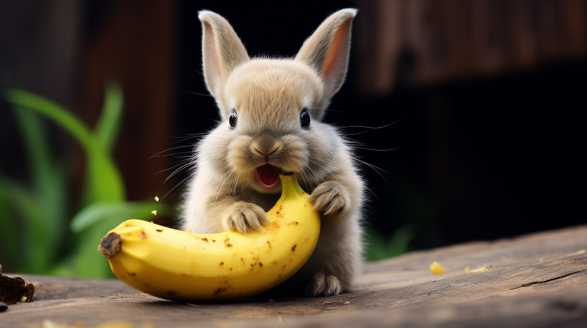
When it comes to raising baby rabbits, feeding them a proper diet is vital for their growth and overall health. As a rabbit enthusiast, I often wonder if baby rabbits can enjoy the delightful taste of bananas.
So, let’s dive into the world of adorable baby bunnies and explore whether bananas can be a part of their diet!
Raising baby rabbits, also known as kits, requires careful attention and consideration. While their tiny size might make you think their eating habits are similar to adult rabbits, it’s important to remember that young bunnies have different dietary needs.
However, once they transition to solid foods, we need to introduce a variety of nutrient-rich options into their diet.
Understanding Baby Rabbit Digestion
Before we dive into the specifics of adding bananas to a baby bunny’s diet, it’s essential to grasp how their digestion works. Baby rabbits have delicate digestive systems, and introducing the wrong foods can lead to severe health issues.
Can Baby Rabbits Safely Enjoy Bananas?
1. Soft and Squishy Goodness
One of the first questions that popped into my mind was whether or not baby rabbits can safely consume bananas. After conducting thorough research and consulting with experts, the answer is yes!
2. Moderation is Key
While bananas are safe for baby rabbits to eat, it’s crucial to offer them in moderation. Treats, such as fruits, should only make up a small portion of their diet, with the majority consisting of hay, fresh vegetables, and specially formulated pellets.
3. Nutritional Benefits
Bananas can provide some nutritional benefits for baby rabbits. They are a good source of potassium, fiber, and vitamin C. These nutrients can support their overall well-being and contribute to healthy digestion.
Guidelines for Feeding Bananas to Baby Rabbits
Now that we know baby rabbits can indeed indulge in bananas, it’s important to establish some guidelines to ensure their health and happiness.
1. Introduce Gradually
When introducing bananas to your baby rabbit’s diet, it’s essential to do so gradually. Start by offering them a small piece of banana and observe their reaction.
2. Monitor for Allergies
Always keep a close eye on your baby rabbit for any signs of allergies or adverse reactions. If you notice any unusual behavior, changes in stool consistency, or digestive problems, stop feeding them bananas immediately and consult a veterinarian.
3. Fresh and Ripe
When selecting bananas for your baby rabbit, opt for ripe ones. Avoid overripe bananas, as they may cause stomach upset.
4. Preparation Tips
To make it easier for your baby rabbit to munch on a banana, consider slicing it into small, bite-sized portions. This will help prevent choking hazards and make it more manageable for them to nibble.
Additional Considerations for Baby Rabbit Nutrition
It’s important to remember that bananas should be treated as a treat and not a staple food for baby rabbits. Here are some key considerations to ensure their nutritional needs are met:
1. Hay, Hay, and More Hay
Hay should make up the majority of your baby rabbit’s diet. It provides essential fiber, aids digestion, and helps keep their teeth healthy.
2. Fresh Veggies to the Rescue
Incorporate a variety of fresh vegetables into your baby rabbit’s diet. Options like dark leafy greens, carrots, and bell peppers can provide a range of essential vitamins and minerals.
3. Pellets in Moderation
Choose specially formulated pellets for young rabbits to supplement their hay and vegetable intake. However, keep in mind that pellets should only make up a small portion of their diet to prevent obesity and digestive issues.
4. Water, the Elixir of Life
Lastly, never forget the importance of providing fresh and clean water to your baby rabbit. Ensure they have access to a constant supply of water to stay hydrated.
So, can baby rabbits enjoy the scrumptious flavor of bananas? Absolutely!
While bananas can offer some nutritional benefits, they should be a small part of a well-balanced diet that primarily includes hay, fresh vegetables, and specially formulated pellets. By following these guidelines and paying attention to your baby rabbit’s individual needs, you can provide them with a healthy and enjoyable diet that promotes their growth and overall well-being.
Hey there, fellow rabbit owners! Today, I want to address a peculiar topic that has caught my attention recently: banana allergies in rabbits.
Join me on this perplexing journey as we dive into the world of rabbit allergies and unravel how we can identify and manage banana allergies in our beloved bunnies.
What’s the Fuss About Bananas?
Bananas are often hailed as a healthy snack for humans due to their high potassium and vitamin content. However, it turns out that not all animals share the same enthusiasm for this fruit.
And it seems like bananas are no exception.
Recognizing the Telltale Signs
So, how can you tell if your bunny is allergic to bananas? Here are some signs to watch out for:
- Gastrointestinal Upset:
- Frequent diarrhea
- Vomiting or regurgitation
- Upset stomach, making them less interested in food
- Skin Reactions:
- Redness
- Swelling
- Itchy skin or visible rashes
- Respiratory Distress:
- Sneezing
- Wheezing
- Difficulty breathing
Remember, these symptoms can vary from rabbit to rabbit, and not all bunnies experience the same allergic reactions. If you notice any of these signs after your bunny consumes a banana, it may be time to consult a veterinarian for a proper diagnosis.
Confirming the Allergy
To confirm whether your rabbit is truly allergic to bananas, your vet might perform certain tests. These tests could include skin prick tests, blood tests, or an elimination diet.
Managing Banana Allergies
If your rabbit’s allergy to bananas is confirmed, don’t panic! You can still keep your bunny happy and healthy by following these simple yet essential guidelines:
1. Removing Bananas from the Diet
The first step is to eliminate bananas from your rabbit’s diet entirely. Even if your bunny has a strong affinity for this fruit, it’s best to avoid it altogether to prevent any further allergic reactions.
2. Seek Professional Advice
Consulting a veterinarian who specializes in exotic animals, such as rabbits, can make a world of difference. They will guide you through managing your rabbit’s allergies and provide you with suitable alternatives to bananas.
3. Introduce a Balanced Diet
Creating a well-balanced diet for your bunny is crucial to keeping them healthy and happy. Make sure to include a variety of fresh hay, water, and leafy greens in their daily meals.
4. Monitor for Cross-Reactions
Rabbits with banana allergies may also be sensitive to other fruits or vegetables. Keep a close eye on your bunny’s reactions when introducing new foods into their diet and be alert to any potential cross-reactions.
While bananas might be a favorite treat for many of us, rabbits can develop allergies to this seemingly innocent fruit. As responsible rabbit owners, it’s vital to identify and manage these allergies effectively for the well-being of our furry friends.
Remember, a healthy and happy bunny is a treasure worth cherishing. Let’s keep our furry companions bouncing with joy, even without bananas in their lives!
What are the Risks of Feeding Bananas to Pet Rabbits?
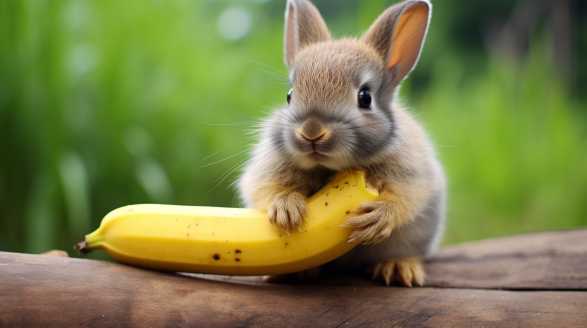
As a dedicated and passionate rabbit owner, I always strive to provide the best care for my furry friends. From choosing the right diet to ensuring their overall well-being, it’s essential to understand the potential risks associated with feeding certain foods to our beloved pet rabbits.
Let’s look into the peculiar world of rabbit nutrition and explore the dangers of feeding bananas to these adorable creatures.
The Curious Case of Bananas and Rabbits
The Bunny Digestion Process: A Jumble of Wonders
Before embarking on our banana adventure, it’s crucial to grasp how rabbits’ digestion works. These herbivores have a unique digestive system designed to process a varied diet consisting primarily of grass, hay, and leafy greens.
Rabbits possess an astounding capacity for fiber digestion due to their cecum. This specialized organ allows them to extract vital nutrients from plant material by producing enzymes and breaking it down into a more digestible form.
The Potential Risks of Bananas
Now that we appreciate our bunnies’ digestive prowess, let’s uncover the potential risks associated with feeding bananas:
- High Sugar Content: Bananas are notorious for their sweetness, thanks to their natural sugars. While rabbits naturally possess a sweet tooth, a diet high in sugar can disrupt their delicate digestive balance.
- Obesity and Weight Gain: Excessive sugar intake from bananas or any other source can contribute to obesity in rabbits. Extra pounds may strain their fragile bones and joints, leading to potential health issues.
- Digestive Upset: Rabbits have a highly sensitive gut, and sudden changes in their diet can cause digestive disturbances such as bloating, gas, or diarrhea. Bananas, being a foreign food for rabbits, may upset their tummy.
- Dental Problems: Rabbits’ teeth are continually growing, and a diet rich in sugary foods can accelerate tooth decay, leading to potential dental issues. Chewing fibrous hay helps maintain dental health, but bananas do not offer the same benefits.
- Nutritional Imbalance: While bananas contain essential vitamins and minerals, they lack the fiber content crucial for a rabbit’s digestion. Offering bananas as a regular part of their diet may deprive them of the necessary nutrients obtained from hay and leafy greens.
Moderation is Key: The Art of Banana Feeding
Even though bananas harbor potential risks for rabbits, they can be enjoyed in moderation. Here are some guidelines to follow when deciding to treat your bunny with this tropical delight:
- Small Quantities: If you must share a banana with your rabbit, ensure it is in minimal amounts. A small slice once or twice a week is generally tolerated by most rabbits.
- Remove the Peel: Before feeding a banana slice to your bunny, ensure you remove the peel entirely. The peel can be tough to digest and may cause intestinal blockages.
- Monitor Your Rabbit: After offering a small piece of banana, keep a close eye on your bunny for any signs of digestive upset, stool changes, or unusual behavior. If any problems occur, discontinue banana treats immediately.
- The Power of Variety: Rather than solely relying on bananas as a treat, diversify your rabbit’s diet with an assortment of fresh veggies and, of course, the tried-and-true hay.
Rabbits are complex creatures with unique dietary needs. While bananas can be a tempting snack, they should be considered an occasional treat rather than a staple part of their diet.
Remember, responsible rabbit ownership means prioritizing their well-being and making informed decisions about their nutrition. So, while a banana may add a touch of variety to your bunny’s taste buds, it’s vital to exercise caution and moderation when introducing this sweet fruit into their diet.
Exploring the Digestive System of Rabbits: Can They Properly Digest Bananas?
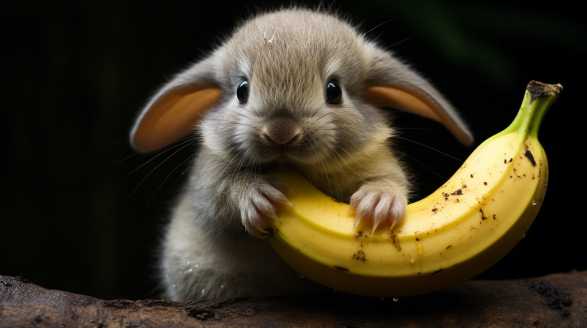
If you are a rabbit lover like me, you may have wondered about the intricacies of their digestive system. After all, these adorable creatures have a reputation for munching on various greens and fruits, so it’s only natural to ponder if they can properly digest bananas.
The Marvelous Digestive System of Rabbits
Before we can understand how rabbits digest bananas, it’s crucial to grasp the basics of their digestive systems. These delicate creatures possess a unique digestive strategy that sets them apart from other animals.
Surprising Fact 1: Rabbits are Hindgut Fermenters
Unlike humans and other simple-stomached animals, rabbits are categorized as hindgut fermenters. This means that their digestion primarily takes place in the large intestine, specifically the cecum.
Surprising Fact 2: Specialized Digestive Anatomy
Rabbits possess a highly specialized digestive anatomy that enables them to efficiently process their herbivorous diet. Here’s an overview of their digestive system:
- Mouth and Teeth: Rabbits have continually growing teeth, which is why they constantly need to chew on tough fibers to wear them down and prevent overgrowth.
- Esophagus: Once ingested, the food travels through the esophagus, a long tube that connects the mouth to the stomach.
- Stomach: The stomach of rabbits is relatively small and doesn’t play a significant role in the digestion of fiber-rich food, like bananas.
- Small Intestine: The small intestine is responsible for absorbing nutrients, such as proteins, fats, and simple sugars, from the digested food.
- Cecum: Ah, the cecum—the center of fermentation! This large organ is where most of the magic happens for rabbits. The cecum is populated by billions of beneficial bacteria that help break down fibrous material into essential nutrients.
- Colon and Rectum: After the cecum has fermented the food, the remaining waste material passes through the colon before being expelled out of the body through the rectum.
Bananas: A Perfect Treat for Rabbits?
Now, let’s get to the heart of the matter—can rabbits properly digest bananas? While rabbits predominantly consume fibrous plants, introducing occasional fruits, like bananas, can add variety to their diet.
Pigments and Sugars
Bananas are known for their vibrant yellow color and sweetness. The bright hue comes from antioxidants called carotenoids.
On the other hand, the high sugar content in bananas may pose a risk if consumed excessively, potentially leading to digestive issues such as diarrhea or an upset stomach.
Nutritional Composition
Let’s take a closer look at the nutritional composition of bananas. Here are the key nutrients found in this beloved fruit:
- Potassium
- Vitamin C
- Vitamin B6
- Dietary fiber
While these components are generally good for rabbits, it’s crucial to remember that bananas should be treated as a treat or supplement—not a staple of their diet. Feeding your furry friend small, banana slices as an occasional snack is a safe way to introduce this fruit in their diet without causing any digestive disturbances.
Nurturing Your Rabbit: You Know Best
As a responsible rabbit parent, it’s essential to listen to your rabbit’s unique needs and preferences. While bananas can be part of a varied diet, some rabbits may not enjoy the taste or texture of this fruit.
Remember, a well-balanced diet primarily consists of hay, fresh water, high-quality pellets, and a variety of leafy greens.
Rabbits possess a marvelous digestive system designed to efficiently process fibrous plant materials. While bananas can be a tasty treat for rabbits, they should be offered in moderation due to their high sugar content.
So go ahead, share a delightful banana slice with your fluffy companion, and let them enjoy this occasional indulgence while keeping their digestive system in mind.
How to Introduce Bananas to Rabbits’ Diet: Step-by-Step Guide

As a proud owner of a furry little friend, it’s essential to ensure that your rabbit’s diet is well-balanced and nutritious. While rabbits primarily thrive on hay, fresh vegetables, and pellets, it’s perfectly fine to incorporate small amounts of fruits into their diet as occasional treats.
So, if you’re wondering how to introduce bananas to your rabbit’s diet, you’re in the right place! Follow this step-by-step guide to safely incorporate this delightful tropical fruit into your bun’s menu.
Why Bananas?
Before we dive into the process of introducing bananas to your rabbit, let’s briefly understand why they can be a healthy and enjoyable addition. Bananas are packed with essential vitamins and minerals that can benefit rabbits when given in moderation.
Bananas also contain vitamin C, which boosts their immune system. Plus, they are naturally sweet, making them a favorite treat for many bunnies.
Step 1: Preparation is Key
- Gather fresh ripe bananas: When introducing bananas to your rabbit for the first time, it’s crucial to choose ripe bananas. Overripe bananas tend to have a higher sugar content, which should be avoided. Opt for yellow bananas with just a few brown spots.
- Start with a small piece: Rabbits have sensitive digestive systems, so it’s best to start with a tiny piece of banana to observe their reaction. Moderation is crucial, and overfeeding bananas can lead to digestive issues like diarrhea.
- Choose an appropriate time: Introducing a new food item to your rabbit’s diet requires patience and careful observation. Pick a time when you can closely monitor their behavior and any possible changes in their stool.
- Offer a small piece: Present your rabbit with a small piece of banana and place it near their regular food bowl. Observe your bunny’s reaction closely. Some rabbits may show immediate interest, while others may be hesitant at first.
- Monitor intake and behavior: Keep an eye on how much banana your rabbit consumes and monitor their overall behavior. If your rabbit seems eager for more, you can gradually increase the amount, but always in moderation.
Step 3: Safety Guidelines
- Limit banana portions: Bananas should never make up a significant portion of your rabbit’s diet. Treat them as occasional snacks or rewards. Aim for no more than a quarter to a half an inch slice per week, divided into smaller portions.
- Observe stool consistency: Pay attention to your bunny’s droppings after introducing bananas. If you notice any sudden changes in size, consistency, or odor, it may indicate that bananas aren’t suiting your rabbit’s digestive system. In such cases, discontinue feeding bananas immediately.
- Consider your rabbit’s health conditions: If your rabbit has a pre-existing health condition, such as diabetes or gastrointestinal issues, it is essential to consult with a veterinarian before introducing any new food into their diet.
Step 4: Variety is the Spice of Life
- Explore other rabbit-friendly fruits: While bananas can be a tasty treat, it’s essential to diversify your rabbit’s fruit selection. Some other rabbit-safe fruits that can add variety to their diet include apples, cherries, strawberries, and blueberries. Remember to introduce new fruits gradually and monitor your bunny’s response.
- Prioritize hay and vegetables: Remember that hay should always be the primary component of your rabbit’s diet. Fresh vegetables (e.g., dark leafy greens, carrots, and bell peppers) should also be provided daily. Fruits, including bananas, should be seen as supplementary to a well-balanced diet.
As responsible rabbit owners, we want our furry friends to lead happy and healthy lives. Adding bananas to their diet can bring joy and flavor, but it’s crucial to follow the steps outlined in this guide to ensure a smooth transition.
Now, let’s introduce some bananas to those curious bunnies and watch their adorable reactions!
Conclusion
Wow, what a journey we’ve been on exploring the world of rabbits and bananas! From uncovering the potential risks and benefits of feeding bananas to our furry friends, to learning how to properly introduce this tropical treat into their diets, we’ve covered it all.
Throughout our adventure, we discovered that while rabbits can enjoy bananas as an occasional treat, moderation is key. Bananas provide essential nutrients like vitamin C, potassium, and dietary fiber, but excessive consumption can lead to digestive upset, weight gain, and tooth decay.
I sincerely hope that this article has helped shed some light on the dos and don’ts of feeding bananas to rabbits. It’s crucial to always prioritize your bunny’s well-being, consult a veterinarian if you have any concerns or questions, and listen to your rabbit’s individual needs and preferences.
Remember, variety is the spice of life! While bananas can make for a delightful treat, there are plenty of other rabbit-friendly fruits and vegetables to explore.
As we wrap up our adventure, I want to thank you for joining me on this journey into the world of rabbits and bananas. I hope you feel more informed and confident about providing the best care for your fluffy companions.
So, let’s keep exploring, learning, and enjoying the incredible world of rabbits together. Whether it’s discovering new treats, creating homemade delights, or simply sharing the love with our furry friends, let’s continue to make their lives as wonderful as they make ours.
Frequently Asked Questions
Can rabbits eat bananas?
Yes, rabbits can eat bananas but in small quantities as a treat. Bananas should not be a staple part of their diet as they are high in sugar and can cause digestive problems if consumed in excess.
Are bananas healthy for rabbits?
Bananas are moderately healthy for rabbits due to their high sugar content. While they provide some vitamins and minerals, it is important to offer them as an occasional treat rather than a regular food item.
How often can I feed bananas to my rabbit?
It is recommended to offer bananas to rabbits only once or twice a week. Moderation is key to prevent any potential health issues that may arise from excessive consumption.
How should I prepare bananas for my rabbit?
Bananas should be given to rabbits in small portions, cut into bite-sized pieces. Make sure they are fresh and ripe, as unripe bananas can be difficult for rabbits to digest.
Can rabbits eat banana peels?
Rabbits should not be fed banana peels. They are difficult for rabbits to digest and may cause stomach discomfort or gastrointestinal blockage.
What are the risks of feeding bananas to rabbits?
Feeding bananas to rabbits in excess can lead to obesity, dental problems, and digestive issues such as diarrhea or bloating. It is important to remember that bananas should only be given as an occasional treat.
Are there healthier alternatives to bananas for rabbits?
Yes, there are many healthier alternatives to bananas for rabbits. These include fruits such as apples, strawberries, blueberries, and leafy greens like kale and parsley. Offer a variety of fresh foods to ensure a balanced diet for your rabbit.
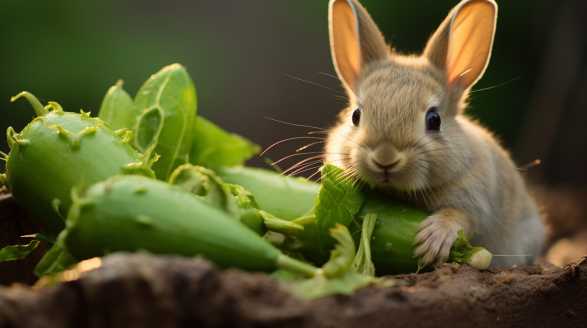
Can Rabbits Eat Okra
Introduction Can Rabbits eat okra? Let’s find out. We’re about to embark on an adventure filled with mysteries, health benefits, and the undeniable allure of okra for our furry friends. Picture this: you’re strolling down the vegetable aisle, and your eyes fall upon the vibrant green pods of okra. You’ve heard whispers about this veggie, […]
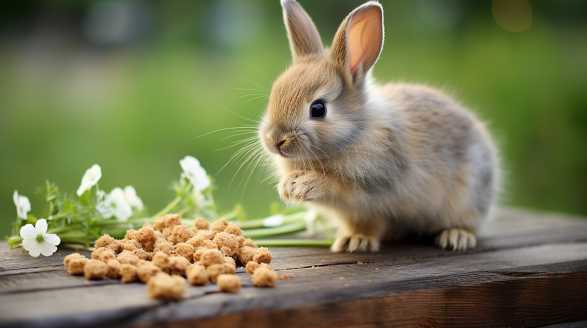
Can Rabbits Eat Alfalfa Pellets
Introduction Hey there, rabbit lovers! Are you looking for the best way to keep your furry friends happy and healthy? we’re diving into the wonderful world of alfalfa pellets and how they can benefit your beloved rabbits. As a long-time rabbit owner and enthusiast, I understand the importance of providing the right nutrition for our […]
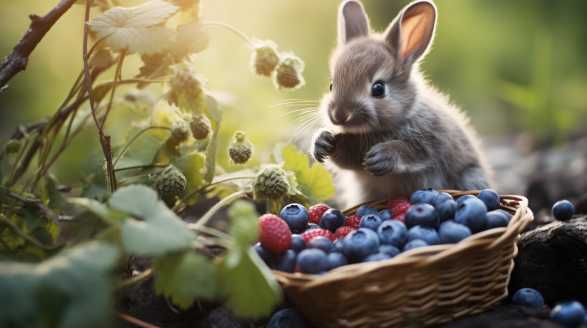
Can Rabbits Eat Blueberries
Introduction Can Rabbits eat blueberries? Let’s find out. It turns out that blueberries, those tiny balls of deliciousness, can be the secret ingredient to take your rabbit’s health and happiness to a whole new level. I know, I know – it sounds almost too good to be true! And that’s exactly what blueberries do! Blueberries […]
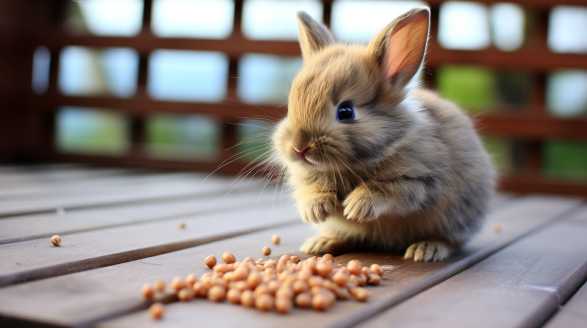
Best Pellets For Rabbits
Introduction Hey there, rabbit enthusiasts! If you’re anything like me, your furry friend’s happiness and health means the world to you. That’s where rabbit pellets come in! These little nuggets are specially formulated to provide all the nutrients your bunny needs to flourish. we’ll explore everything you need to know about rabbit pellets. We’ll go […]
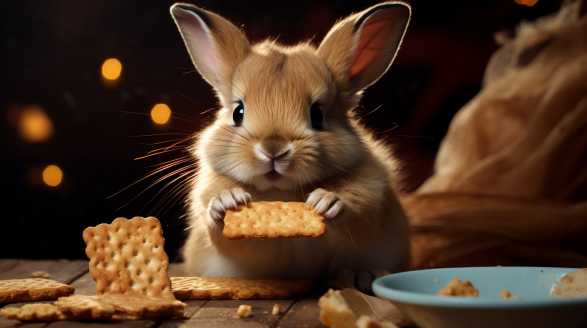
Can Rabbits Eat Crackers
Introduction Can rabbits eat crackers? Let’s find out. As a passionate rabbit lover, I’ve spent countless hours researching and consulting with the experts to bring you the most intriguing insights and thrilling information. Are these seemingly innocent crackers truly the key to our rabbits’ happiness, or could they be hiding some sinister secrets? Get ready […]
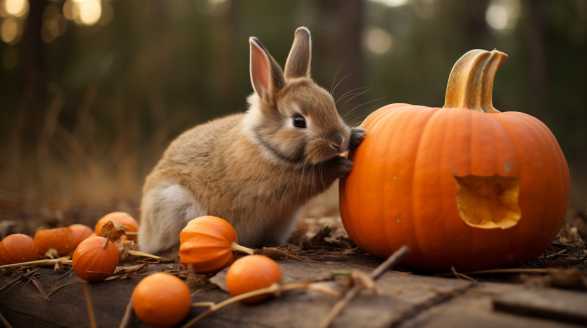
Can Rabbits Eat Pumpkin
Introduction Hey there, fellow rabbit lovers! I’ve got some exciting news to share with you about a topic that has completely blown my mind – pumpkin allergies in rabbits. Let’s find out, can rabbits eat pumpkin? I was just as shocked as you are right now! I mean, who would have thought that our fluffy […]

